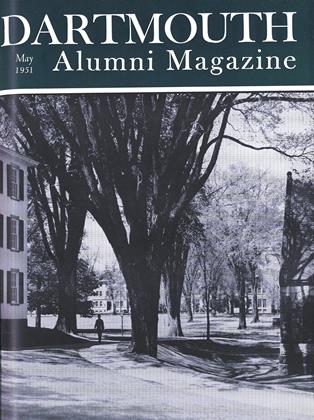About this time of year Dartmouth seniors are normally involved in lining up jobs, if they haven't already settled that important matter, but in the present sorry state of the world the possibility of military service is a factor that complicates the outlook for most of the men who will get sheepskins on June 17. For those who are assured of a civilian status the job prospects are the best they have been in a number of years, according to Donald W. Cameron '35, who is in charge of placement work in the Personnel Bureau; and even for seniors facing a draft call, opportunities are open as companies move to get outstanding men on their preferred lists or to give them some training before they go into service.
During the past three months 66 companies have sent representatives to Hanover to interview Dartmouth students, and some 200 other firms have written to the placement office concerning job openings. "The majority of these companies have been willing to hire good men regardless of draft status," Mr. Cameron reports, "but the first preference, of course, has gone to veterans and men classified as 4-F."
Starting salaries for men graduating in June range from $2,600 to $3,600 a year, with the average at $3,000. The greatest demand this year is for technically trained men, especially those with engineering skills. This is borne out by Dean Kimball of Thayer School, who reports that there is a greatly increased demand for engineers, caused by the stepped-up production for national defense and by the shortage of college-trained personnel that has followed the slump in enrollment in engineering schools across the country. Starting salaries for engineering graduates with Masters' degrees range from $3,200 to $4,500 and average about $3,900, according to Dean Kimball.
At the Tuck School, where placement is in charge of Prof. Harry R. Wellman '07, experience this spring indicates that next to engineering the greatest demand is for men who have been trained in accounting. Other fields in which demand exceeds supply at the business school are management training and banking. Except in insurance there is little demand in the sales field, according to Professor Wellman. Tuck School is in the favorable position of having two or three openings for each graduate, with the salary range from $2,800 to $4,000 a year.
Despite the general job situation, fewer students this year have taken advantage of the help offered by the placement office. Mr. Cameron reports. He attributes this to the draft jitters and to the failure of some June graduates to look beyond impending military service and to take steps now that will give them the inside track on a job after service. With all the drawbacks of the present world situation, business opportunities for the young college graduate today are unusually good, he feels, because the wake of World War II has created many gaps on the executive level and has created a correspondingly greater chance for rapid promotion for the man who can demonstrate ability.
SPRING PRODUCES HANOVER STROLLERS AND WIRE FENCES TO KEEP THEM IN BOUNDS
 View Full Issue
View Full Issue
More From This Issue
-
 Article
ArticleDeaths
May 1951 -
 Article
ArticleBlueprinor Survival
May 1951 By WILLIAM STUART MESSER -
 Article
ArticleHe Values the Rare In Books and Life
May 1951 By JOHN HURD '21 -
 Class Notes
Class Notes1918
May 1951 By ERNEST H. EARLEY, DONALD L. BARR, RICHARD A. HOLTON -
 Article
Article1949
May 1951 By ROBERT H. ZEISER, DAVID S. VOGELS JR., JOHN F. STOCKWELL -
 Class Notes
Class Notes1905
May 1951 By GEORGE W. PUTNAM, GILBERT H. FALL, FLETCHER A. HATCH
C.E.W.
-
 Article
ArticleThe Core of Dartmouth
October 1948 By C.E.W. -
 Article
Article"Great Issues"
November 1949 By C.E.W. -
 Article
ArticleTop Priority
June 1950 By C.E.W. -
 Feature
FeatureThe Magazine Has A Birthday
OCTOBER 1958 By C.E.W. -
 Books
BooksThe Magazine's Loss
DECEMBER 1963 By C.E.W. -
 Feature
FeatureAlbert I. Dickerson '30 1908-1972
JULY 1972 By C.E.W.







